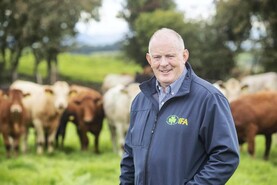Part-time farmers are less likely to exit farming as a result of Brexit compared with full-time farmers, Teagasc chief economist Kevin Hanrahan has said. This is because the household income for part-time farmers is less reliant on the farm itself due to the presence of off-farm income.
Speaking on Tuesday in a Teagasc ConnectEd webinar, Hanrahan said that the structural changes already happening in Irish agriculture would be accelerated by Brexit.
Beef is the most exposed sector and the move from full-time beef farming to other sectors such as dairy would be sped up by a further reduction in profitability.
“I think Brexit will lead to lower prices for many elements of Irish agricultural output. It will reduce profitability and lead to a restructuring. People will exit [farming],” Hanrahan said. “The magnitude of that response may not focus on small farms as they almost certainly have other non-agriculture income in the household … I wouldn’t expect enormous structural change in the short to medium term. But Brexit will accelerate the structural changes already happening in Irish agriculture.”
Meat from animals slaughtered in the last few weeks will be marketed post-Brexit
He said that farmers are already receiving lower prices as a result of Brexit.
“[Beef] prices would be higher in a world where Brexit hadn’t happened,” he said. “Meat from animals slaughtered in the last few weeks will be marketed post-Brexit.”
Trevor Donnellan, head of the Teagasc agricultural economics and farm survey department, said that sterling is 15% to 20% weaker than it would have been at the peak of its value prior to the referendum in June 2016.
Uncertainty
The Teagasc webinar also highlighted the fact that the state of uncertainty has seen farmers postpone investment decisions and this has had a negative effect on the industry.
“[There’s] not a lot farmers can do to influence the price of what they sell. What they should do given the ongoing Brexit uncertainty is hold off on big-ticket investments until there is clarity on future trade relationships,” Hanrahan said.
“Processors will have to become more competitive and create new products to attract markets outside of the UK. Farmers need to think about how they can become more productive with the resources they have.”






 This is a subscriber-only article
This is a subscriber-only article










SHARING OPTIONS: